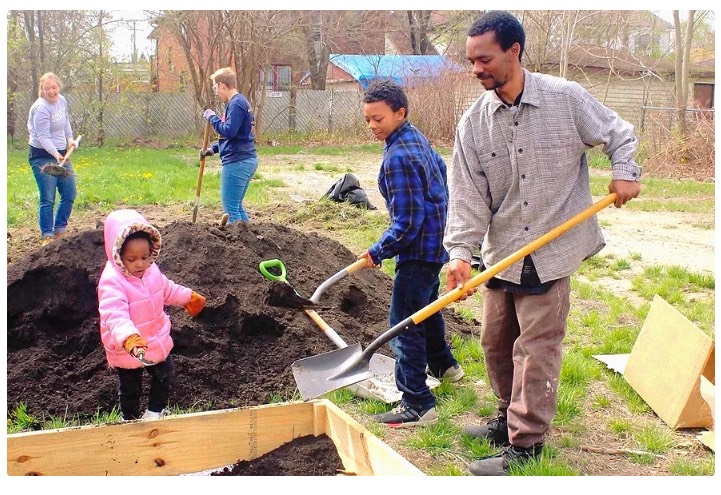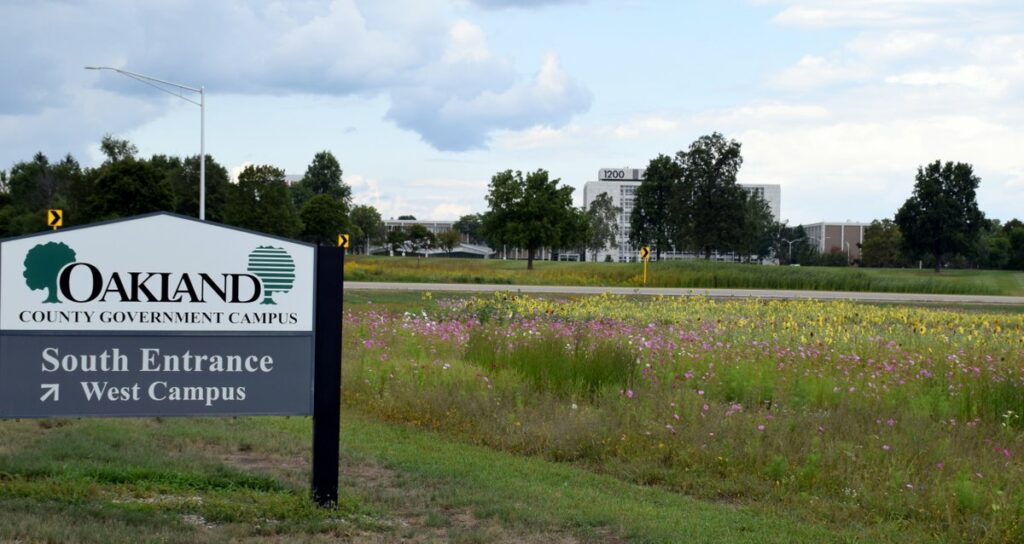EcoWorks: Addressing Climate Change by Enabling Sustainable Communities

EcoWorks is a nonprofit that works at the intersection of community development and sustainability. Based in Detroit, EcoWorks serves residents, households, community organizations, businesses, and municipalities, working to create just, equitable, and inclusive solutions to climate change. SBN Detroit spoke with Briana DuBose, EcoWorks executive director, to find out more. Q: Tell us about EcoWorks A: EcoWorks is a Detroit-based nonprofit that addresses climate change by enabling Michigan communities to be more environmentally and economically sustainable. We provide transformative climate and sustainable solutions for communities that are underserved and often unseen and unheard. We do this through community development, green consulting, home energy assistance, climate advocacy, education, and workforce development. Our Eco-D program is an equitable approach to securing affordable, healthy resilient homes and neighborhoods. We design and advocate solutions that promote utility affordability, housing security, climate resilience, and resident-led neighborhood development. We also work to engage community members to be part of learning about sustainability and provide direct service programs, upgrades and repairs, and more for underserved communities. Currently, we are working with four areas in Detroit – Hope Village, Southwest, Berg-Lahser, and Yorkshire Village to build out EcoDistricts. We offer comprehensive resources to help these areas transition to decarbonization and electrification. The program also provides residents and community organizations with resources to achieve healthy, affordable, resilient, and energy-secure homes and neighborhoods. Q: How do you work with Detroit neighborhoods and communities specifically? A: We look at ways to ensure the health and safety of all households. We focus on disadvantaged communities working with people who are vulnerable to the impacts of climate change – for example air quality. We partner with coalitions to improve policy and design innovative financial models for healthy, green, housing and neighborhoods. An example of this is River Rouge, which is surrounded by multiple plants and therefore has poor air quality. We go in and have workshops to discuss sustainability and energy-saving measures in their area. People are often surprised that asthma can be caused by poor air quality. We will go in and perform needs assessments on homes and work toward proper sealing and weather stripping and filters so the residents can have clean air in their homes. We also work with the communities in a bigger way to do things like build rain gardens, create green spaces, and more toward the things the specific areas need. Q: How does the Strategic Community Initiatives Program work? A: We develop custom-fit climate and energy solutions for municipalities, school districts, health systems, small businesses, and nonprofits. SCI has secured over $5 million in clean energy investments and over $30 million in lifetime savings for over thirty Michigan municipalities. EcoWorks serves as the lead technical provider as part of the Sacred Spaces Clean Energy Grants, eliminating disproportionate energy burdens for low-income congregations, inclusive of Black, Indigenous, and People of Color (BIPOC) communities statewide. Eleven houses of worship in low-income Michigan neighborhoods from Detroit to the Upper Peninsula will become more energy efficient with support from this $1.24 million grant of federal funds through the Michigan Department of Environment, Great Lakes, and Energy (EGLE) to make improvements that reduce their consumption of fossil fuels for electricity, heating, and cooling. From this, we expect the congregations to achieve a 15% energy savings that will go back into the communities. Q: How can a business in Southeast Michigan take advantage of EcoWorks? A: We bring a unique blend of people and change-management skills coupled with technical assessment and project management capabilities to businesses. Contact us and we’ll set up a meeting to talk. We can develop and manage holistic energy and climate action plans collaboratively for organizations. Q: How do you think EcoWorks impacts Southeast Michigan businesses? A: EcoWorks can help organizations stay nimble and resilient as energy costs and climate impacts rise. We can develop energy plans and implement energy projects by engaging people and bringing them together. We are often conveners. We are on the front line in communities, and we go into businesses to discuss how they may be contributing to the environment and sustainability in their communities. Often, businesses don’t know where to begin or may think sustainability initiatives are going to be expensive. We help educate them and show the ROI. Most businesses want to leave a better footprint on their community; they just need the resources to do so. Q: What are the biggest opportunities EcoWorks represents for Detroit? A: While our roots are firmly planted in energy conservation, we have grown to emphasize all aspects of sustainable development as it relates to building affordable, energy-efficient residential housing and commercial buildings. We are committed to promoting environmental equity and we take pride in helping communities get there. Be sure to subscribe to our newsletter for regular updates on sustainable business practices in and around Detroit.
Sustainability Progress in Oakland County

Erin Quetell became Oakland County’s first chief environmental sustainability officer in 2021 after working for four years as the City of Ferndale’s environmental sustainability planner. Quetell received a bachelor’s degree in Biology from Grand Valley State University and a master’s degree in Public Administration in Environmental Science and Policy from Columbia University in New York. Before her time in Ferndale and Oakland County, Quetell worked in the private and nonprofit sectors with a focus on environmental issues through service in the Huron Pines AmeriCorps program, at the Greening of Detroit, and through consulting at OHM Advisors. She is a graduate of the 2020 Michigan Women’s Municipal Leadership program and Leadership Oakland Class XXIX. She served as previous co-chair for the Great Lakes Climate Adaptation Network, and is a current board member for the nonprofits Make Food Not Waste and the Clinton River Watershed Council. SBN Detroit spoke with Quetell about her work, sustainability priorities, and how businesses in the county can be involved. Q: In 2021, you stepped into the role of Oakland County’s first sustainability officer. Now, two years later, what impact do you think you’ve been able to make? A: Well, it’s not just me. I do have a small team, and what I’m most proud of is we conducted a competitive bidding process and negotiated a renewable energy purchase so that we now have a third-party purchase agreement. Seventy percent of all electrical needs for Oakland County facilities will be from solar, which helps us toward our climate goals and helps demonstrate the priority of our decarbonization goals. Additionally, we have finalized an environmental sustainability plan for the county campus and facilities which includes a review of all the county’s buildings to best determine energy and water efficiency improvements, accessibility, carbon reduction, and other sustainability-related upgrades. Also notable, I think, is the work we are doing on the tri-county electric vehicle planning project. Residents and businesses are definitely interested in electrification, and we want to be able to offer people in our 62 cities, villages, and townships the resources they need to learn more. To that end, we developed an EV toolkit that’s a great resource for anyone interested in EV deployment. Q: What are your top priorities for the county when it comes to sustainability? A: We’ve been working to have a very clear understanding of what we need to do as an entire county in response to the climate crisis. Being fairly new in this role, I’ve been spending time meeting with groups and organizations to understand all local activity and in turn working to align with the MI Healthy Climate Plan with these greater efforts to maximize impact. As I mentioned, electrification is a priority along with the alternative fuel corridors throughout Oakland County. With funding in the pipeline, we are identifying ways and partners to expand these alternative fuel corridors to include right of ways such as Grand River and Woodward and also facilitate greater community engagement around future vehicle electrification in general. Another priority is continuing the county’s energy efficiency programming – such as weatherization programs – and leveraging opportunities to reduce the energy burden for residents and businesses. We have underrepresented communities in Oakland County that have been left out, and we need to provide help and resources to everyone going forward. Q: I read that Oakland County became part of a class of 16 communities across the country that will be working to get the county LEED-certified by late 2023. What impact will this have on the county, stakeholders, residents, and businesses? A: You can’t manage what you don’t measure and LEED certification for counties is a really good basis for sustainability metrics. LEED for cities sets a framework to collect data. The outcome of these metrics can then be utilized as a resource for businesses in the county in their acquisition and retention of talent – showing that it’s a good place to live and work. Q: How do you work with businesses in the county to become more sustainable or equitable? A: One piece of the puzzle is our procurement practices. We are being very intentional in diversifying contractors and suppliers for county opportunities. Back to the LEED Certification, we can share out stronger metrics and qualifications when we bid out projects. Government contracts can be overwhelming for smaller companies, and this information will make things clearer so we can ultimately work with a broader range of companies in the county. Outwardly facing, we have a large education push, specifically through our Oakland80 program, community navigators, and other workforce development programs. As electrification becomes more prevalent, people need additional and new training to support that transition. We are working to make sure our future workforce is nimble and has the skills in demand. So far, much of my work has been networking and discussion. I have been in many conversations with various businesses related to mobility solutions such as electric vehicle charging infrastructure, batteries, and other sustainability practices. I work closely with our economic development team to start integrating more sustainability opportunities and show how the county is supportive and pushing for greater sustainability. There is still much to be done. Q: What impact do you think Southeast Michigan businesses have on sustainability within the county and as it pertains to your role? A: I think businesses have a lot more potential to move the needle than many people realize. One of the things we are talking about is how can we develop more sustainability networks and resources and how can we work collaboratively toward our climate goals. Businesses are becoming vested, and we are starting to see more collaboration, understanding, and pressure to address greater ESG efforts. There is so much opportunity here – we have not scratched the surface, and I look forward to the potential outcomes. Q: What advice would you give businesses in Oakland County if they are looking to work together toward sustainable practices? A: I think starting with evaluating where you are today is the best way


